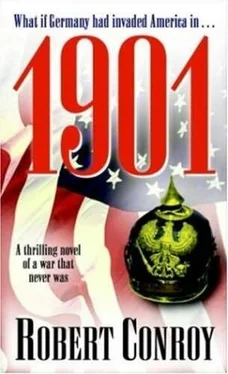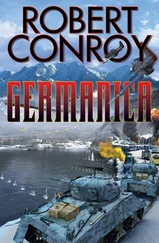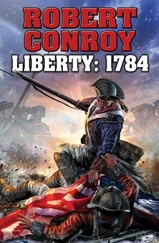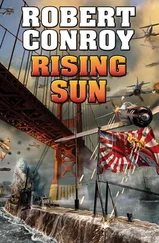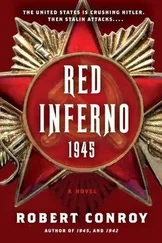Robert Conroy - 1901
Здесь есть возможность читать онлайн «Robert Conroy - 1901» весь текст электронной книги совершенно бесплатно (целиком полную версию без сокращений). В некоторых случаях можно слушать аудио, скачать через торрент в формате fb2 и присутствует краткое содержание. Жанр: Альтернативная история, на английском языке. Описание произведения, (предисловие) а так же отзывы посетителей доступны на портале библиотеки ЛибКат.
- Название:1901
- Автор:
- Жанр:
- Год:неизвестен
- ISBN:нет данных
- Рейтинг книги:4 / 5. Голосов: 1
-
Избранное:Добавить в избранное
- Отзывы:
-
Ваша оценка:
- 80
- 1
- 2
- 3
- 4
- 5
1901: краткое содержание, описание и аннотация
Предлагаем к чтению аннотацию, описание, краткое содержание или предисловие (зависит от того, что написал сам автор книги «1901»). Если вы не нашли необходимую информацию о книге — напишите в комментариях, мы постараемся отыскать её.
1901 — читать онлайн бесплатно полную книгу (весь текст) целиком
Ниже представлен текст книги, разбитый по страницам. Система сохранения места последней прочитанной страницы, позволяет с удобством читать онлайн бесплатно книгу «1901», без необходимости каждый раз заново искать на чём Вы остановились. Поставьте закладку, и сможете в любой момент перейти на страницу, на которой закончили чтение.
Интервал:
Закладка:
Ian was the first to break the spell. “Your General Sherman once said that war is hell. This has to be what he meant. I have never seen anything like this in my life.”
Patrick’s thoughts ran the same way. The sight was both astonishing and horrifying. “Ian, this must have been what it was like at Waterloo or Gettysburg.”
“Of course.” Ian watched as Patrick’s brigade surged forward, almost into the densely packed German river of men trying to flee to the safety of the west. Beyond them and plainly visible was the American force advancing north. The Germans were being squeezed, and soon the two American forces would converge and the Germans would be surrounded. “Perhaps even Agincourt.”
Patrick watched appalled as American gunfire scythed through the German mob, piling up bodies three and four deep. In most cases German discipline still held, and the return fire was almost as devastating. There seemed to be as many brown- as gray-clad bodies.
A new and hideous clatter joined in the torrent of sounds. The northward-approaching Americans had brought together a number of machine guns and were using them as massed weapons. The effect was devastating. German soldiers fell like wheat before a diabolical mechanical reaper.
“I’m sorry,” said Ian. “What I saw previously was no hell. This is. Patrick, I believe we are seeing the future. Machines of mass destruction and using rows of machine guns are only the beginning.”
The result was a parting of the German human sea, and the Americans joined forces. As the afternoon droned on, many of the trapped Germans attempted to break out, but their attacks were disorganized and fragmented and easily beaten back. Sometimes a few would make it through and run on, but they were the exception. Even more telling was the fact that no attempts were made by the Germans to link up from the west. The German command seemed to have written off its trapped soldiers.
“Behind you,” hissed Ian. Schofield and MacArthur were approaching. They were prudently alone and on foot. Two more men joining the three on the hill would not attract undue attention from maddened German gunners.
Schofield spoke. “Well done, Patrick. It would appear we’ve bagged a large number of them.”
Patrick mumbled appreciation and watched as MacArthur moved away from the little group. His face seemed tight and strained. Schofield explained. “He just got word that his son was badly wounded. He hasn’t gotten a chance to confirm anything.” Patrick nodded and gave the other man room for his silent grief.
There was an awareness that the sound level had decreased markedly, and the men turned again to what they could see of the battlefield, now strangely silent.
MacArthur stirred himself and came over. He shielded his eyes with his hand and stared into the distance, as did the others. “Thank God,” he said softly. “They’re surrendering.”
As they watched, German soldiers started throwing down their weapons and holding their arms up in the air.
CHAPTER TWENTY-EIGHT
Theodore Roosevelt sipped his tea and looked out at the now-empty Lafayette Park. Was it only a few weeks ago that it had been the scene of riotous celebrations? He watched as a January wind took a whipped piece of newspaper about. He hoped it was from a Hearst publication.
“John, I have made some plans.”
John Hay placed his cup on its saucer with a gentle clink. “I’m not surprised.”
“This is a wonderful opportunity for the United States. I aim to see that we do not waste it. I will ask Congress for a constitutional amendment that will enable me, with their consent, to nominate someone as vice president.”
“Excellent idea.”
“Assuming it passes, I wish that person to be you.”
“Theodore, I am honored, but I am also rather old.”
Roosevelt flashed a toothy grin. “You are too old and I am too young. It averages out. John, let me be realistic. I need your experience and wisdom, and the country knows it. I am the youngest man ever to hold this office, and when I run on my own, many will still consider me too young. John, I need you.”
Hay thought briefly of others, like Root, who openly wished higher office. It would be a problem. But he could deal with it. “I’m honored.”
“Good. That’s settled. Now to the rest of it. What happened last summer may never happen again.”
“Agreed.”
“Therefore, I am going to propose, along with accelerating the navy expansion, that our standing army be set at two hundred and fifty thousand men. That will be nearly a threefold increase over what we have now. We will need more warships, and that means submarines, not just battleships.”
“The Democratic opposition will not like it.”
Roosevelt rose and commenced to pace. “Damnit, John, we are a world power whether we wish to be or not. In the space of three short years we have defeated both Spain and Germany, and now the British wish us to join with them in an alliance of English-speaking peoples that would span the globe.”
“Some are afraid the British will dominate us in any such alliance,” Hay pointed out.
“Let them try. Their empire is on the decline, only they haven’t yet figured it out, whereas ours is ascending. No, we will start out as equals and commence to dominate them. Especially when we dig a canal across the Isthmus of Panama.” He clapped his hands in glee. “We have a navy; we will have an army and, very soon, a canal. We are a power!”
Hay sipped his tea. He would rather have had a whiskey. The idea of a canal was just about at the implementation stage. It would go forward whether the Colombians wanted it or not. He also felt that the American mood would permit Roosevelt’s military expansions, and would do so for a number of years until some parsimonious future Congress again decided that years of peace meant no future of war. The shock of the attack on New York was far from having worn off. The Germans had been defeated, at least for now, but there were other potential threats. Japan, for instance, and Russia. Or perhaps the Ottomans. America would never again stand alone in this world.
Hay raised his cup. “To the future, Theodore, to the future.”
Holstein’s new office was in a building a few blocks away from where the construction crews were trying to repair the damage to the chancellery. It was of no import to him. He had always considered the chancellery a singularly ugly building. However, it had been a shame that the kaiser had been unwilling to leave. So many had died because of the man’s stubbornness. Holstein shuddered as he recalled the mobs, interspersed with army reserve units, as they stormed the building, sacked it, and burned it. Imprinted forever too, was the sight of the dead and dying on the street and the lynched victims dangling from the ornate lampposts. That must not happen again.
“Herr Becker, I must offer you my congratulations.” Holstein held out his hand to the other man who had just entered. Becker smiled tightly.
“Thank you, Count von Holstein. I understand I had your support. In the background, of course.”
“It was the only way, dear Becker. The old regime is in such disrepute that any public support of you by anyone with a ‘von’ in front of their name would have been a kiss of death. But now you are the prime minister of a new Germany.”
“A temporary title, I’m afraid. When the new constitution is drawn and ratified, it may only be a memory.”
“Then we must not permit that to happen.” Becker’s face reflected surprise.
“Have you decided what to do with the royal family?” Holstein asked.
“Wilhelm II is banished, of course, and I believe headed for Denmark with his insufferable wife. His first war, I’m afraid, will also be his last. But there is sentiment for the crown prince as a figurehead. He would become, of course, Kaiser Wilhelm III. The boy is only eighteen and seems to be more stable than his father. He could easily be controlled if it came to that. But what did you mean, we must not let my title become a memory?”
Читать дальшеИнтервал:
Закладка:
Похожие книги на «1901»
Представляем Вашему вниманию похожие книги на «1901» списком для выбора. Мы отобрали схожую по названию и смыслу литературу в надежде предоставить читателям больше вариантов отыскать новые, интересные, ещё непрочитанные произведения.
Обсуждение, отзывы о книге «1901» и просто собственные мнения читателей. Оставьте ваши комментарии, напишите, что Вы думаете о произведении, его смысле или главных героях. Укажите что конкретно понравилось, а что нет, и почему Вы так считаете.
